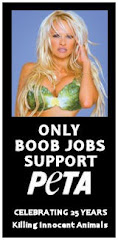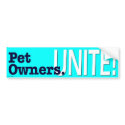A Cincinnati woman's bulldog died while in the "care" of the SPCA. The bulldog was picked up while roaming unattended, and, according to the suit, mis-identified as a "banned breed".
Tuesday, February 24, 2009
Suit of Justice
Sunday, February 22, 2009
(Dog) Beauty Pagents
An interesting article from the UK Telegraph: Size Zero row reaches dog shows.
The Kennel Club has banned weigh-ins for the breed at Crufts in response to fears that owners were denying food and water to dogs in the hours before they were due on the scales. It has also relaxed the regulations for other shows, leaving it to individual judges to choose whether to hold a weigh-in or not.
I don't know how much truth is behind this, but it is logical to suspect that it might be somewhat widespread. The real tragedy is that using scales to keep a dog at a certain weight for a breed, which is supposed to be a tool to indicate function (yeah, take that for what it's worth) has NOT had the desired effect of encouraging breeders to actually breed a dog that naturally reaches that weight.
Now, if this same dog was required to actually do something (standing on a pair of scales is not doing something) functional, form (weight in this case) would follow. Agility competitors are learning this, and doubtless building the foundation for more than a few breed splits down the road...
And if the dog doesn't have to do anything, then the competition is only a superficial beauty pageant.
Saturday, February 21, 2009
Zero carbs for dogs
From time to time, I touch on the subject of diet. If you look at the books I recommend in the side panel at The Gutendog Press, you will see such titles as "Grow your Pups with Bones" and "Pottengers' Cats". Coupled with my link to Dr. Eades most excellent blog, my furry comrades might cleverly arrive at the conclusion that I support the raw / low carb ways of life.
You would be correct.
It doesn't mean I practice it exclusively. I have, and then I haven't. And then I have, and then I haven't. You know how things go. But in the "have not" periods, we are less optimally sustained.
Recently I scholar.googled this little gem of a study from 1977 -
Metabloic responses to exhaustive exercise in racing sled dogs fed diets containing medium, low or zero carbohydrate by Elaine P. Hammel, V.M.D., D.S. et al.
The superior ability of racing sled dogs fed diet A [protein, fat, carbohydrate in the proportion 39:61:0] to mobilize body fat during a bout of exercise, coupled with their hematopoietic response to training suggests that this is a highly suitable diet or these dogs.
Other features of dogs fed diet A were higher serum concentrations of albumin, calcium and magnesium; these may help to combat tendencies towards hypovolemia, hypocalcemia, and hypomagnesemia. These propensities of a low carbohydrate, high fat, and protien diet may also be advantagious in other dogs subjected to sustained strenuous work, such as foxhounds, gunning dogs and military scout dogs.
What makes this study unique is that they were not trying to make the sled dogs lose weight. Often low-carb studies in dogs (cats, etc) are focused on weight loss, just like in humans. There are several studies showing the effectivity of low carbohydrate diets in getting your dog or cat back to a healthy weight. I will post about those another time.
In this study, they looking at performance. And, carbs were not required there, either.
Wednesday, February 11, 2009
What's wrong with Stumpy?
Stump barely made it past 5 or so. He left the show ring in 2004 and later nearly died from a mysterious medical condition. The vets at Texas A&M saved him."It was miraculous," Sommer said.
I don't think for a second it was pure coincidence that a 10 year old dog came out of retirement to win Westminster, just after a damaging expose on the the health and fitness of purebred dogs.
Pulleeze.
But even then, the only one they could find had already nearly died of a mysterious ailment?
WHAT WAS THAT MYSTERIOUS AILMENT?
Inquiring minds want to know.
Wolves v. Dogs
The wolves are winning in Ontario.
View Larger Map
Wolf attack in Timmins
Both families are sure the dogs were attacked by wolves.
“This was gruesome,” said Jeanne Lajoie. “This is something you just can’t accept.”
Both were husky-cross dogs, large in size, and the families learned how another neighbourhood dog had been killed just days before T-Bone.
Friday, February 6, 2009
The Rights of our Companion Fur Children
The United Nations Convention on the Rights of the Child is a "human rights" treaty that is instilling a lot of fear in American parents. As it stands today, the USA is one of the few remaining countries that has not signed this treaty.
According to the group ParentalRights.org, among the draconian impositions of the treaty
"The best interest of the child principle would give the government the ability to override every decision made by every parent if a government worker disagreed with the parent’s decision."Now, why should you, the average
Once upon a time we were pet owners. We made decisions about our pets that best benefited our relationship with them. We decided what to feed them, how to medicate them, whether we should amputate some part of them (testicles, ovaries, claws, ears, tail...) and eventually whether their suffering out weighed their quality of life. We made those decisions with complete autonomy.
Those days are changing, and they're changing one word at a time.
The group "In Defense of Animals" puts out a lesson book geared toward 2nd and 3rd graders. The booklet is titled "Guardians for Life". The lesson aims to teach a clear separation between being and animal "owner" and being an animal "guardian".
Sometimes we say that we own our animals, but it’s better to say that we care for them.The parents are kindly let in on the reason:
We can own toys. We can own books. We can own all kinds of things. But animals are
living beings, not things. We don’t own our friends, so we shouldn’t own other living
beings, either. After all, our animals are a part of our family, and we are their guardians.
Today, your son or daughter was encouraged to be a guardian to animals and to younger children who depend on them.
The equation of pets with brothers and sisters. "Animals are part of our family" is a repetition of a phrase that is VERY commonly used even amongst the most obdurate of meat-eating hunters. The attachment people feel for their pets has not gone unnoticed amongst the petatics who are trying to liberate animals.
Merely changing this one word ["owner" to "guardian"] does not change the legal status of animals, but it does begin to reflect modern views and differentiate your dog from your kitchen table. - http://animalrights.about.com/od/animallaw/f/GuardianOwner.htm
Our friend Cass Sunstein writes in "The Rights of Animals: A Very Short Primer":
Almost everyone believes in animal rights, at least in some minimal sense; the real question is what that phrase actually means.
Of course any animals would be represented by human beings, just like any other litigant who lacks ordinary (human) competence; for example, the interests of children are protected by prosecutors, and also by trustees and guardians in private litigation brought on children’s behalf.
Hence some people urge that certain animals, at least, are “persons,” not property, and that they should have many of the legal rights that human beings have.26 Of course this does not mean that those animals can vote or run for office.
Their status would be akin to that of children—a status commensurate with their capacities. What that status is, particularly, remains to be spelled out.
The US will need some precedent to spell out exactly what the rights of animals and children should be, and a duly signed international United Nations governed treaty would be the perfect antecedent.
HSUS, PeTa and the AKC would be perfectly placed to provide "social workers" for every pet owner animal guardian family.
The terms "Companion Animals" and "Animal Guardians" are already prevalent in our society. They are in a large sense symptomatic of an ongoing erosion of our property rights. But is the transition to child-like animal rights also a mainstream position, or one still lingering in the fringes with the Petatics?
Cass Sunstein, in the paper linked above, gave us this -
Every reasonable person believes in animal rights. Even the sharpest critics of animal rights support the anticruelty laws.
For Cass, this statement is the mainstream launching pad from which these other animal rights will burst forth. Is our Regulation Czar the lunatic fringe?
Or is your humble libertarian author the lunatic fringe? A perfect libertarian society would not have anti-cruelty laws, rather economic pressures of society and the trials by jury would influence behaviour.
Many people are skeptical of the possible success of such an approach, but ironically, Cass Sunstein is not (see the linked paper). He does, however, need the existence of animal cruelty laws as a foundation to build up to child-like rights.
Tuesday, February 3, 2009
Microchip blamed for dogs' death
Microchip Implant
A fluffy bundle of life, love, and enthusiasm named Charlie Brown was laid to rest last week, the victim of a microchip implant gone horribly wrong. The long-haired, purebred Chihuahua bled to death in the arms of his distraught owners, Lori and Ed Ginsberg of Agua Dulce, California, just hours after undergoing the controversial chipping procedure.
Dr. Reid Loken, the board certified veterinarian who performed the chipping, confirmed on Friday that Charlie died from blood loss associated with the microchip. He cited "an extreme amount of bleeding" from the "little hole in the skin where the [microchip implant] needle went in" as the cause of death. He said he was both saddened and puzzled by Charlie's death.
The Ginsbergs were quick to absolve Dr. Loken of responsibility for Charlie's death. "He's a great vet and this was not his fault. The real blame is with the people who forced us to implant our dog against our better judgment," they said.
Worth the Trouble
It can be difficult to convey to people the importance of life, liberty and property. Perhaps people are so accustomed to seeing thoughts and ideas acted out for them that they have trouble putting feeling to words.
This clip, from the movie Wild River, posted by Gary North, brings the right to property to life.
Later in the movie, "Mrs. Garth" uses our four-legged friends to illustrate her point further:
Later in the film, she stages a scene for the bureaucrat. It is not clear to him or the viewer at first exactly what is going on. She has a confrontation with a black man, one of dozens who do all the work on her island, which is a low-income plantation.
She confronts the man. She says she wants to buy his dog. He refuses to sell. She offers him $15, which in the rural South in the Great Depression was a lot of money. He refuses. She asks him if the price is fair. He says the dog is not worth much, but he refuses to sell.
Then she ups the ante. She tells him that she is going to take his dog, so he might as well take her money. He still refuses.
She then tells the bureaucrat that this is what ownership is all about. She walks away, having made her point.
Property Rights are a subset of Life, Liberty and the Pursuit of Happiness, as explained by Ayn Rand.
The right to life is the source of all rights—and the right to property is their only implementation. Without property rights, no other rights are possible. Since man has to sustain his life by his own effort, the man who has no right to the product of his effort has no means to sustain his life. The man who produces while others dispose of his product, is a slave.
Bear in mind that the right to property is a right to action, like all the others: it is not the right to an object, but to the action and the consequences of producing or earning that object. It is not a guarantee that a man will earn any property, but only a guarantee that he will own it if he earns it. It is the right to gain, to keep, to use and to dispose of material values.
.





.jpg)




 javascript:void(0)
javascript:void(0)